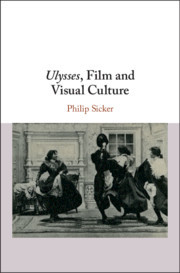Description
Ulysses, Film and Visual Culture
Author: Sicker Philip
Shows how Joyce's narrative styles and his protagonists' perceptions are shaped by visual technologies, including dioramas, stereoscopes, mutoscopes and film.
Language: EnglishApproximative price 107.80 €
In Print (Delivery period: 14 days).
Add to cart
Publication date: 09-2018
276 p. · 15.7x23.5 cm · Hardback
276 p. · 15.7x23.5 cm · Hardback
Description
/li>Contents
/li>Biography
/li>
Although Joyce was losing his sight when he wrote Ulysses, Stephen's and Bloom's visual experiences are extraordinarily rich and complex. Absorbing the influences of popular visual attractions such as dioramas, stereoscopes and mutoscopes, their perceptions of Dublin are shaped by what Walter Benjamin calls 'unconscious optics'. Analyzing closely the texture of their impressions and of Joyce's prismatic narrative styles, Philip Sicker explores the phenomenon of sight from a wide-ranging set of perspectives: eighteenth-century epistemology (Locke and Berkeley), theories of the flaneur (Baudelaire and Benjamin), Italian Futurist art (Marinetti and Boccioni), photography (Barthes and Sontag), and the silent films Joyce watched in Dublin and Trieste. The concept of 'spectacle' as a mechanically-constructed visual experience informs Sicker's examination of mediated perception and emerges as a hallmark of modernist culture itself. This study is an important contribution to the growing interest in how deeply the philosophy and science of visual perception influenced modernism.
Introduction: Joyce's spectacles: technologies of sight; 1. Ineluctable visuality: Stephen's ways of seeing; 2. 'Caught in this burning scene': Stephen in the gaze of others; 3. Snapshots from the pavement: Bloom as modernist flaneur; 4. Painting motion: 'wandering rocks' as futurist narrative; 5. 'Alone in the hiding twilight': Bloom's cinematic gaze in 'Nausicaa'; 6. Mirages in the lampglow: 'circle' and Melies's dream cinema; 7. Vision conjoined: Stephen and Bloom's intersubjective perception.
Philip Sicker is Professor of English at Fordham University, New York, and co-editor of Joyce Studies Annual. He has published widely on James Joyce, Henry James, D. H. Lawrence, T. S. Eliot, Thomas Mann, Vladimir Nabokov, narrative theory and film.
© 2024 LAVOISIER S.A.S.
These books may interest you

James Joyce in ZurichA Guide 105.49 €




